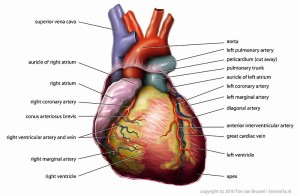 According to the National Heart Lung and Blood Institute, one in every five deaths in the United States is caused by smoking. It is the most common form of recreational drug use and the most common method of smoking is done through cigarettes. While each and every organ of the body is affected by smoking at varying degrees, the most fatal damage is caused to the heart.
According to the National Heart Lung and Blood Institute, one in every five deaths in the United States is caused by smoking. It is the most common form of recreational drug use and the most common method of smoking is done through cigarettes. While each and every organ of the body is affected by smoking at varying degrees, the most fatal damage is caused to the heart.
Effects of Smoking on the Heart
The main component of the 4000 chemicals present in a cigarette tobacco smoke is the nicotine. On entering the heart, it gets attached to certain proteins known as the nicotinic receptors. As a result, the newly formed molecule sends signals to the smooth muscles of the blood vessels to shrink. This leads to a reduction in the flow of blood to and from the heart.
The same effect of narrowing of the pathways of the heart takes place when smoking causes formation of waxy and sticky substance called plaque in them. Such an undesirable state of the heart leads to blood pressure rise by 5-10mm of mercury and excess strain on the heart muscles to pump blood all over the body. In either of these cases, the smoker can then experience either chest pain, heart attack or heart failure eventually leading to death. The nicotine also raises the heart beat by 10-20 beats per minute.
Research studies in Denmark have shown that the risk of heart ailments in women smokers is 50 percent more than the risks in men. The reason behind this observation is attributed to the interaction of the female hormone estrogen with the harmful tobacco chemicals like nicotine.
Smoking by women taking birth control pills and by diabetic patients can cause even greater risk of heart ailments. Unfortunately, the harmful effects of second hand smoke on the heart are no different from the damaged caused to this organ by active smoking in adults.
The presence of second hand smoke in houses affect the children by raising the risk of heart ailments in them in later years. This is because second smoke reduces the levels of good cholesterol HDL and damages the sensitive and developing tissues of the heart in children.
The risk of getting heart ailments owing to the exposure to second hand smoke is very high in children suffering from asthma. Premature babies as passive smokers can even develop respiratory distress syndrome condition.
Research studies have learnt a little about the effects of smoke from cigars and pipes on the heart and its vessels. However, it’s proven beyond doubt by studies, that quitting smoking and lesser exposure to secondhand smoke can improve the general health of the heart. All the above mentioned risks of heart ailments owing to smoking can be reduced by giving up this bad habit.
Good habits which should go hand in hand along with quitting smoking are intake of healthy diet, physical activities, limited consumption of alcohol, adequate sleep, regular check up of the health after 40 years and maintaining proper body mass index.
Latest statistics reveal that 38 million people in the United States have succeeded in quitting smoking and yet another 50 million of them are struggling hard to be in the same group.
Let us try to shortlist some of the top points that affects the heart due to smoking –
- Less availability of oxygen to the heart leading to heart pain or angina
- Increased chances of blood clotting
- Increase in the beating of the heart
- Increase in blood pressure
- Damage of the cells of the pathways through which blood flows to and from the heart
- Build up of fatty substance in the arteries and vein of the heart
- Fatigue caused by smoking habit takes away the ability to exercise which indirectly makes the heart weak
Awareness about the outcome of continuing the habit of smoking and a wise, courageous decision at the earliest can prove to be in the good interest of health in the long run.
Conclusion: Though it is tough to observe, quitting smoking for a period of one year brings down the harmful effects of smoking on the heart by 50 percent. If the efforts are sustained for 15 years at a stretch, the risks of heart ailments equal that of a normal individual.

1 Comment
Actually 40 percent of people who are heavy smoke are most likely to die by the age they reach their retirement age whereas these numbers are very low for non smokers which is near to 18 percent. Near to 11 percent of deaths due to stroke happens to smokers. People who smoke heavily re 4 times more likely to get a stroke. Above reasons shows effects of smoking on the heart which is severe. However when a person stops smoking, his body starts repairing and nearly regains its original condition in 10 years.